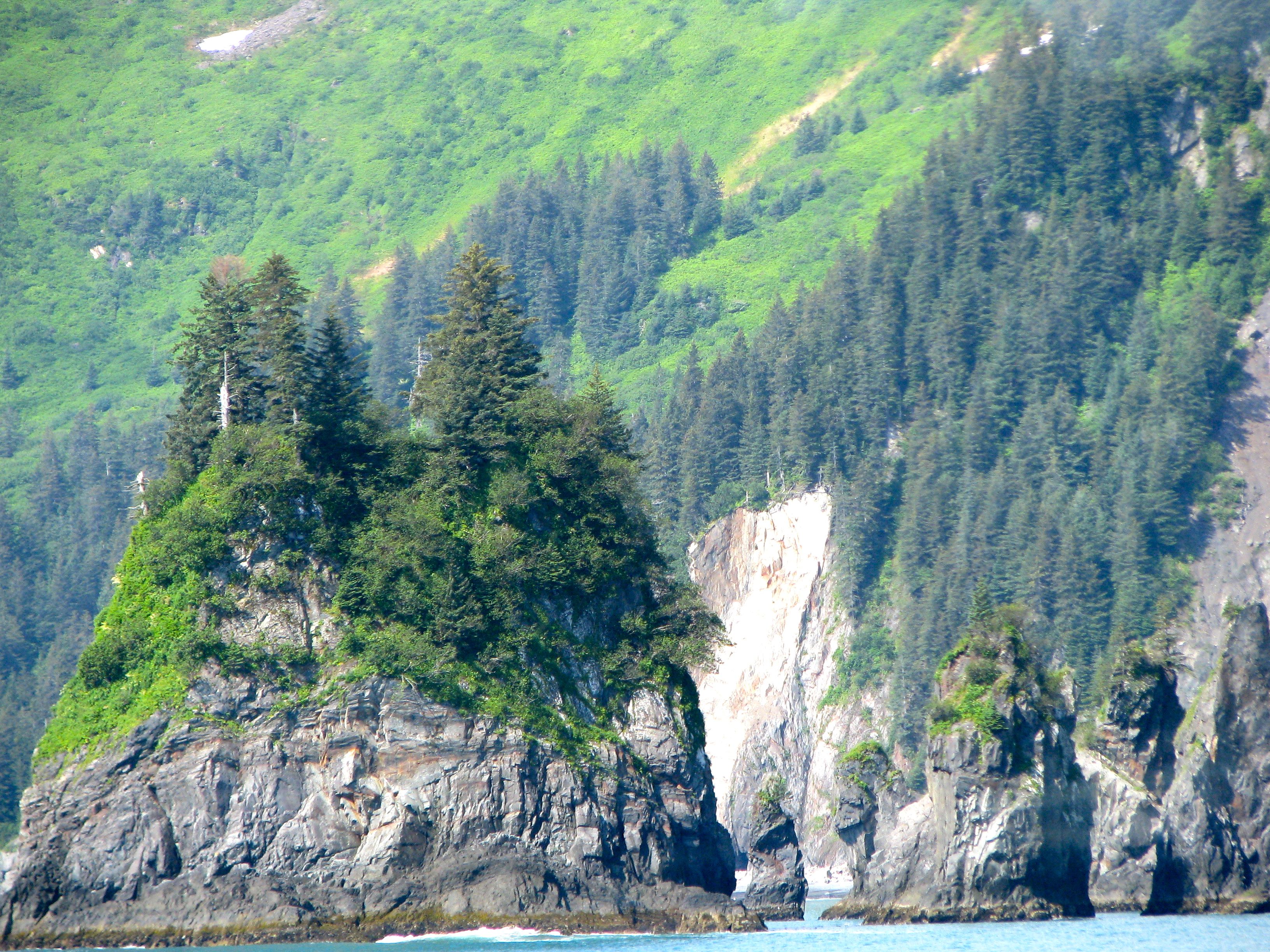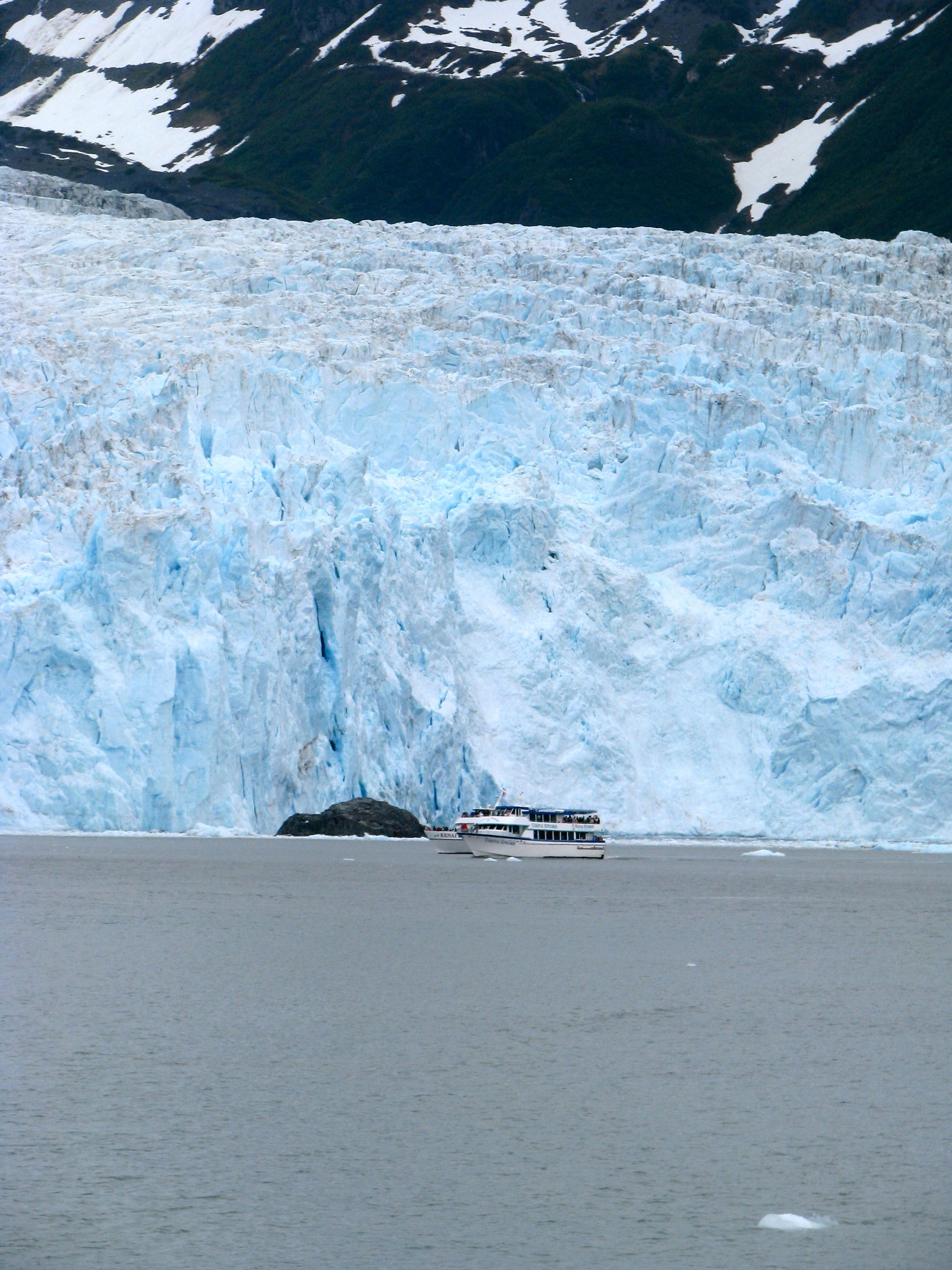Near Seward, Kenai Peninsula Borough, Alaska, USA (July 2010)
We continued on our exploration of the Kenai Peninsula, leaving our base in Cooper Landing heading towards Seward (map). Here we’d booked a day-long sea excursion through one of several companies that operate moderately-sized boats that cruise through Resurrection Bay and Aialik Bay, two of the bodies of water that define Kenai Fjords National Park. These ships are made to hold maybe 150 people and they’re dwarfed by the massive cruise ships found elsewhere in the harbor but they get the job done.
Passengers can sit on an enclosed upper or a lower deck, or even on seating out in the elements. It was a warm, sunny day but I’ve been on these types of journeys before so we selected indoor seating along an upper-deck window. True to form, those passengers sitting quite comfortably before we left the harbor lasted only a few minutes once underway and exposed to the wind. We were also glad later when we pulled on our jackets to go out on deck when something interesting came into view. One should always be prepared in the Kenai for changes in weather, both temperature and rain.
This particular voyage lasted most of a day, exploring the western side of Resurrection Bay on the way out, over to Aialik Bay and all the way to Aialik Glacier, then returning via the eastern side of Resurrection Bay. It also included lunch. The ship stopped frequently along the way to watch the natural scenery or the wildlife as warranted, too. A whale spout on the horizon? No problem — the boat would get close to where it once appeared and wait for the next spout.
Kenai Mountains

The Kenai Mountains appeared as a constant backdrop on an essentially cloudless day with only small wisps hugging the summits. These mountains dominate the landscape of all but the western portion of the peninsula, stretching about 120 miles from the Chugach range down to the south. Nearly 50,000 people live in the Kenai Peninsula Borough and get to experience this amazing scenery on a daily basis.
However, the vast majority of Kenai Fjords National Park is inaccessible by automobile (Exit Glacier being the exception) and only available on foot for the most hearty and adventurous hikers. Ordinarily one must take to the water to get the most remarkable views, either by kayak or by using one of these more comfortable excursions.
Islets and Fjords

The scenery also dazzles on a much smaller scale. Forces of wind, water and ice have carved the landscape into myriad shapes. Small islets dot the bays carved by glaciers to form fjords. Greenery clings to every possible surface in this place of abundant rainfall and snowmelt, set beside backdrops of solid mountains rising towards the sky. Waves flow through caves, through the small cracks and channels, and around the islets in an endless variety of currents and eddies.
Aialik Glacier

The Aialik Glacier flows four miles down from the Harding Icefield into Aialik Bay [see my Harding Icefield Flightseeing page]. It’s a tidal glacier, meaning it terminates within a body of water subject to tides. Ice falls from the face of the glacier into the bay, sometimes calving icebergs and sometimes making tiny cubes of crushed ice more appropriate in size for a cocktail.
Watch and listen. The glacier talks to those who are patient. It creaks and groans as it slowly flows down the mountain pass. Then it cracks as ice breaks free and crashed into the water below. It even creates its own whooshing winds due to the temperature differences between air, water and glacier.
Aialik isn’t small. Compare the size of the ship in the distance to the face of the glacier. It goes up a couple of hundred feet and stretches along a face maybe a mile wide. The blue color is a natural tint created when snow is compressed by succeeding seasons of snow repeated many times until the weight forces it in a most extreme manner. This is a process that can take up to fifty years. From there it may flow into one of the many glaciers leading down from the icefield in a journey that might last hundreds or even thousands of years.
Animal Encounters

Animals are another star attraction in the Kenai Fjords. We were lucky enough to see a mother and juvenile humpback whale frolicking in the shallows on the western side of Aialik Bay. The show lasted a good fifteen minutes and probably went on much longer but our ship had to start heading back to Seward.
In other places we observed Steller Sea Lions in colonies at pullouts atop the rocks. These endangered pinnipeds living along the north Pacific coastline have been in decline for the last several decades and no single explanation has been uncovered. Scientists watch them closely and they’ve set a video camera near one of the colonies and they can be watched live from the Alaska SeaLife Center back in Seward.
We also got to see a wild mountain goat hanging to a ledge, a bald eagle gathering material for its nest, and puffin colonies, both horned and tufted. I’d seen Atlantic Puffins the prior year in Maine so it was a joy to see two other varieties at Kenai Fjords. Those weren’t the only birds by any means. Many of the rocky outcrops and islets featured boisterous colonies of shearwaters, storm-petrels, terns and others.
A half-day or full day cruise of Kenai Fjords National Park is a wonderful way to get an introduction to the area with a minimal investment of time and effort.

Leave a Reply